Here’s another quickie roundup, this time on convergences among tech products, marketing, and storytelling:
-
- Who knew that GMail was story-worthy (though I have learned to no longer question any story application)? GMail users tell their stories here. Actually, it’s not so odd to tell stories about an e-mail application, but why GMail over any other? The site offers success stories about job-hunting using GMail, collaborating with a co-author in a faraway land, saving a relationship with a girlfriend, communicating with a spouse serving in Iraq, and much more. It’s not clear, though, how GMail makes these email communications more successful than another email application would.

- Also in the Google realm, “The T-Mobile Google Phone demonstrates one of the best uses of storytelling for business I have seen in quite a while,” according to The Story Lady, Ronda Del Boccio, who goes on to say: “This is absolutely brilliant use of storytelling.” She’s referring to the video here. You have to watch a bit for the storytelling to unfold — for example, a little scenario in which a guy is locked out and Googles an all-night locksmith on his Google phone. You hear players’ voices, but the video focuses on the phone, as though the actors in the story are invisibly using the phone’s touch screen. I’d have to agree — it’s good storytelling.
- Staying with the cellphone theme, this time the Apple iPhone, Kevin Fox writes at Fury:
- Who knew that GMail was story-worthy (though I have learned to no longer question any story application)? GMail users tell their stories here. Actually, it’s not so odd to tell stories about an e-mail application, but why GMail over any other? The site offers success stories about job-hunting using GMail, collaborating with a co-author in a faraway land, saving a relationship with a girlfriend, communicating with a spouse serving in Iraq, and much more. It’s not clear, though, how GMail makes these email communications more successful than another email application would.
When Apple releases a product, you know it’s released. You know its features, you know its character, you know its story, because Steve Jobs told it to you. You know whether you want it and you know how you feel about it even if it will be weeks before you actually see or touch one.
Fox contrasts Apple’s storytelling with other cellphone manufacturers’ failure to tell their products’ stories. His bottom line is: “Don’t let people who don’t have your best interests at heart tell your story to your customers.” (It’s interesting to read Fox’s reflections — from Dec. 19, 2009 — in light of Apple’s pullout and Jobs’s nonappearance at MacWorld.)
